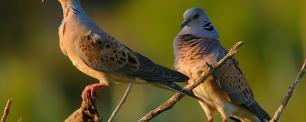Only 17% of endangered species protected by EU directives
The journals Environmental Research Letters and Scientific Reports have recently published two articles in which researchers from the Forest Science and Technology Centre of Catalonia (CTFC) and CREAF call for new policies to be oriented to improving the conservation of endangered species.

Despite the conservation strategies of the last few decades, there has been little improvement in the status of biodiversity in Europe. What is going wrong?
A study led by CTFC researcher Virgilio Hermoso has reviewed the EU Birds and Habitats Directives’ coverage of endangered species in Europe. To do so, a team of researchers from the CTFC and CREAF compared the territory across which such species are actually distributed and the sites that make up the Natura 2000 network. The results are conclusive. Only 17.4% of critically endangered, 16.9% of endangered and 15.4% of vulnerable species present in the EU are currently covered by the Directives. Counterintuitively, they are not prioritized at Natura 2000 sites.
The results are conclusive. Only 17.4% of critically endangered, 16.9% of endangered and 15.4% of vulnerable species present in the EU are currently covered by the Directives. Counterintuitively, they are not prioritized at Natura 2000 sites.
In the words of Lluis Brotons, a CSIC researcher based at CREAF and one of the study’s authors, “the Natura 2000 network isn’t big enough and doesn’t cover the territory necessary to protect the species listed in the Directives”. Nonetheless, the researchers note that some endangered species not listed in the Directives inhabit Natura 2000 sites too, and therefore receive protection. The network’s potential for conservation has thus yet to be fully tapped.
With the 2020 landmark established by the EU Biodiversity Strategy and the Convention on Biological Diversity looming, the scientists feel that there is an urgent need to analyse their results and propose alternative approaches. “We have to find a way to reduce the gap between what we’re protecting and what we’re leaving without cover, although it’s also important to include endangered species that are already protected on the lists”, says Alejandra Moran from InForest, a joint research unit run by the CTFC and CREAF.
Four proposals for strengthening post-2020 conservation strategies
Virgilio Hermoso has identified four ways to tackle the problems with the EU’s current biodiversity strategy. The first is to draw on the IUCN’s Red List to broaden the representation of endangered species. The second is to ensure that such species are covered by adequate conservation plans by improving the management of Natura 2000 sites. The third is to integrate the management of species and habitats outside protected areas. The fourth is to increase the resources allocated to conservation management.

The authors state that updating management plans would make it possible, for example, to cover all species of threatened vertebrates with just 3% of the Natura 2000 sites. The majority of the sites that most require such updates are in southern Europe, which is where the concentration of endangered species is presently at its highest.
After 2020, the EU Biodiversity Strategy will need an exhaustive review to improve its coverage of endangered species (especially those not listed in the Birds and Habitats Directives).
Additionally, it will be necessary to endeavour to make the most of existing resources and carry out conservation work more efficiently, or to plan conservation action in a more wide-ranging manner, both in and outside the Natura 2000 network’s protected sites. The researchers point out that if conservation action were extended to areas beyond the network’s sites, compatibility with other land uses would have to be taken into consideration wherever possible.
Articles:
Hermoso, V., Morán-Ordóñez, A., Canessa, S., & Brotons, L. (2019). Realising the potential of Natura 2000 to achieve EU conservation goals as 2020 approaches. Scientific Reports, 9(1), 1-10.
Hermoso, V., Morán-Ordóñez, A., Canessa, S., & Brotons, L. (2019). Four ideas to boost EU conservation policy as 2020 nears. Environmental Research Letters, 14(10), 101001







